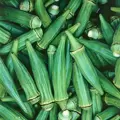Reviews
No reviews found
Description
Why Choose Clemson Spineless Okra?
Clemson Spineless is beloved for its smooth, spineless pods, which make harvesting more comfortable compared to other okra varieties that can be prickly. The plants are known for their high yields and ability to withstand heat, producing consistently throughout the season. Okra lovers appreciate its rich, full-bodied flavor, perfect for various culinary uses, from frying and grilling to stewing and pickling.
Key Benefits:
- Spineless pods: Easy to harvest without the irritation caused by prickly stems.
- Heat-tolerant: Thrives in hot climates, making it an ideal crop for warm regions.
- High yield: Produces a continuous supply of tender, flavorful pods throughout the growing season.
- Versatile in the kitchen: Great for frying, stewing, pickling, or adding to soups and gumbo.
Growing Requirements
Clemson Spineless okra is a warm-weather crop that thrives in full sun and well-drained soil. It is relatively low-maintenance and performs well in various soil types as long as it is consistently moist and rich in organic matter.
Light and Soil Requirements
Okra requires full sun, at least 6-8 hours daily, to grow its best. It prefers well-draining soil that is rich in organic matter. Before planting, amend the soil with compost or a balanced fertilizer to give the plants a nutrient-rich start.
Planting Instructions
Clemson Spineless Okra can be direct-seeded outdoors once the soil has warmed to at least 70°F. In cooler climates, you can start seeds indoors 3-4 weeks before the last frost date and transplant them outside once the danger of frost has passed.
Outdoor Sowing Tips:
- Planting Depth: Sow seeds 1/2 inch deep in the soil.
- Spacing: Space seeds about 12-18 inches apart in rows spaced 3-4 feet apart to allow for ample airflow and room for growth.
- Watering: Keep the soil consistently moist, but avoid overwatering, which can lead to root rot.
Indoor Seed Starting
You can plant seeds indoors in seed-starting trays or pots for an early start. Keep the soil warm and well-watered, as okra prefers consistently warm conditions for optimal germination and growth.
Caring for Clemson Spineless Okra
Clemson Spineless Okra is relatively low-maintenance, but regular watering and feeding will help boost yields and plant health. Deep watering is essential during dry periods, and applying mulch around the base of the plants can help retain moisture and suppress weeds.
Fertilizing
Okra benefits from regular feeding throughout the growing season. Apply a balanced fertilizer or compost every 3-4 weeks to encourage steady growth and fruit production.
Staking and Support
While Clemson Spineless Okra plants are sturdy, they can sometimes benefit from light staking, especially in windy areas, to prevent them from leaning or toppling over as they grow taller.
Harvesting Clemson Spineless Okra
The spineless pods of Clemson Spineless are typically ready for harvest 50-60 days after planting. For the best flavor and tenderness, the pods should be harvested when they are 3-4 inches long. Allowing the pods to grow too large can produce harsh, fibrous fruits.
Harvesting Tips:
- Pick frequently: Regular harvesting encourages the plant to produce more pods. Pick the pods every few days to keep production high.
- Use sharp tools: Use pruning shears or scissors to cut the pods from the plant, as pulling them can damage the plant.
Culinary Uses
The Clemson Spineless Okra variety offers a mild, earthy flavor that pairs well with various ingredients. It is a versatile and delicious choice for preparing Southern-style fried okra, adding it to soups and stews, or pickling the pods for a tangy treat.
Popular Culinary Uses:
- Fried okra: Bread and fry for a crispy Southern classic.
- Gumbo: Add to stews like gumbo for texture and flavor.
- Pickled okra: Preserve the pods in vinegar for a tangy, crunchy snack.
- Grilled or roasted: Toss with olive oil and seasonings and grill or roast for a simple side dish.
Final Thoughts
Okra, Clemson Spineless is a top choice for gardeners seeking a heat-loving, high-yielding variety with smooth, spineless pods that are easy to harvest. Its full-bodied flavor and wide range of culinary uses make it a versatile addition to any garden.
The 10,000 seed count ensures a bountiful harvest for home or commercial growing, making this variety an ideal choice for anyone looking to enjoy a steady supply of fresh, delicious okra all season long.











